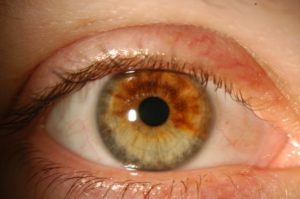
Several people in both Alabama and North Carolina have been diagnosed with a rare eye cancer known as ocular melanoma. Although found in only 6 out of 1 million in the US, dozens of ocular melanomas were diagnosed in mostly women 20 to 30 years of age.
Interestingly, through the use of social media, multiple cases were discovered through websites formed by groups from Auburn University, Alabama as well as in Huntersville, North Carolina.
Similar to skin cancer, the melanin or pigmented cells within your eye can also mutate and cause melanoma in or around the eye although this only accounts for about 5% of cases. Specifically uveal melanoma, or melanoma on the inside of the eye, was discovered in these cases. Such rare melanomas are generally seen in patients between 50 and 60 years of age. Ongoing investigations by physicians have not yet revealed the cause for this unusual geographical collection of cases.
“These reported cases are bizarre in both the incidence and how young the patients are. I applaud the work that is being done to find a common thread, however given the rarity of the disease this will be difficult even in the setting of a localized spike,” says ocular oncologist, Jesse L Berry, MD and assistant professor of clinical ophthalmology at the USC Roski Eye Institute.
Unlike skin cancer, which can be caused by sun damage, identifying the causes of eye cancers has been a challenge. Research has revealed that certain eye cancers can be hereditary or caused by random genetic mutations. Depending on the severity of the eye cancer, treatment options may include radiation via brachytherapy or with proton beam, or even removal of the eye.
Possible symptoms related to uveal melanomas generally include: blurring, distortion or loss of vision, shadow over vision which may come and go, as well as flashes and floaters.
“This is a devastating disease that can lead to blindness and even death if not appropriately diagnosed and treated early – and many of these tumors are asymptomatic so a complete dilated exam by an ophthalmologist is necessary to diagnose melanoma. Bringing awareness to this rare disease through social media platforms can give physicians and epidemiologists more information on the incidence of this disease in hopes of one day finding a cure, “ says Dr. Berry.
by Debbie Mitra, PhD
To make an appointment at the USC Roski Eye Institute, please call (323) 442-6335 or contact us to schedule a consultation today.
References
1. https://www.nbcnews.com/health/cancer/unusual-cases-rare-eye-melanoma-puzzle-doctors-two-states-n870551
2. https://www.cancer.org/cancer/eye-cancer/about/what-is-eye-cancer.html
Topics
